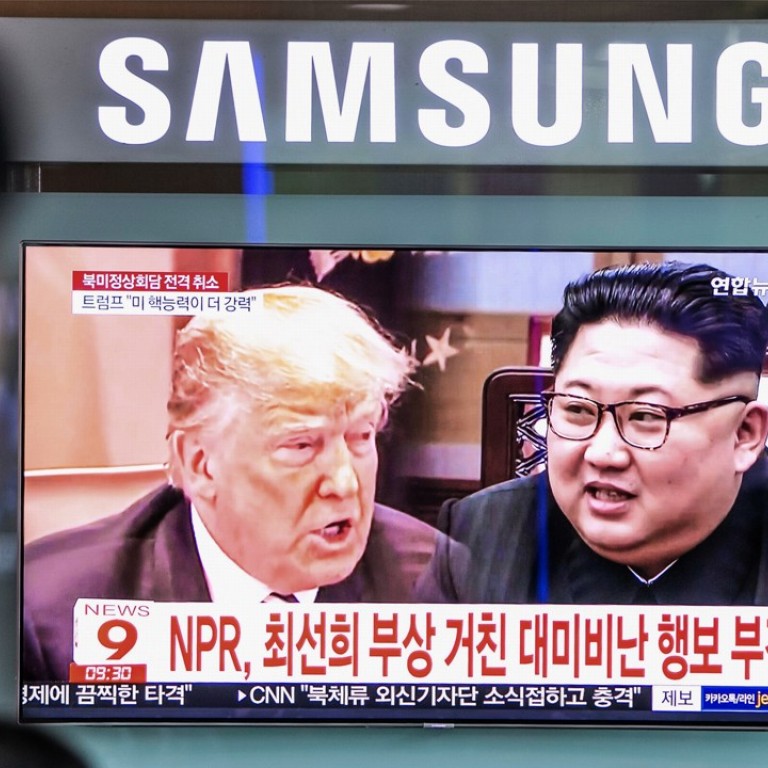Advertisement
Advertisement

North Korea tag-team diplomacy takes a hit as Trump learns that loose lips sink summits
John Barry Kotch says there are several reasons for the cancellation of the Trump-Kim summit, from too many voices on the US side to gaps in expectations between Washington and both Koreas. However, negotiations can resume after a ‘cooling-off’ period
A carefully worded letter from US President Donald Trump to Kim Jong-un threw cold water on the planned June 12 summit with the North Korean ruler in Singapore, but left the door open to meeting at another time and/or place. The key question is whether this is a setback or a breakdown in the process. For now, however, the takeaway is that loose lips sink ships – and summits.
On the US side, instead of one person or department taking the lead – Secretary of State Mike Pompeo would have been logical, having previously met Kim twice – there was a cacophony with National Security Adviser John Bolton and Vice-President Mike Pence chiming in with statements that infuriated the North. There was also the facile assumption that the Max Thunder exercise would get a pass from Pyongyang as had Foal Eagle.
More fundamentally, the gulf is wide and deep between the two sides, lacking a common definition of denuclearisation or a timetable for phasing out the North Korean arsenal in exchange for security assurances, a peace treaty, sanctions relief and economic assistance. One possibility would be to take advantage of the apparent chemistry between Kim and Pompeo to work up a future summit following preparatory meetings. This could take place following a cooling-off period before or after South Korean President Moon Jae-in’s scheduled trip to Pyongyang in the autumn.
The two sides are already heavily invested in a diplomatic process with no dearth of activity on and around the peninsula. In the space of a fortnight, Kim flew to China to meet President Xi Jinping, Pompeo landed in Pyongyang to pin down details in advance of the summit, Moon and Chinese Premier Li Keqiang showed up in Tokyo for a three-way summit with Japanese Prime Minister Shinzo Abe and, this week, Moon touched down in Washington, briefing Trump on the takeaways from his own summitry with Kim.
Watch: Trump’s ‘art of deal’ on North Korea summit
While the two Koreas pulled off a choreographed round of political theatre at Panmunjom last month, Moon needs Trump to succeed in reaching a denuclearisation scenario with Kim to realise his own agenda of reconciliation and economic cooperation. More broadly, what is currently taking place among and between the two Koreas, the US and China is a diplomatic dance we haven’t seen before, a spectacle akin to “tag-team” diplomacy. But unlike wrestling, the party outside the ring may have more clout than the one inside.
This is clearly the case with China and North Korea. If and when Kim goes mano a mano with Trump, he will also carry water for Xi, given their complementary goals reflected in Kim’s two pre-summit visits to China. While Kim needs China in its corner as a backup, as well as Xi’s assent in pursuing a strategy for phased denuclearisation, China needs North Korea as a buffer and will not jeopardise Pyongyang’s survival by turning the last screw on economic sanctions. Paradoxically, however, an agreement between the US and North Korea on denuclearisation would create geopolitical space for the North to pursue new relationships, potentially to China’s disadvantage.
Moreover, the two tag teams are asymmetric – the national interests of the US and South Korea do not align as seamlessly as Beijing and Pyongyang’s. While Washington and Seoul are committed to deterring and defending against future North Korean provocations, South Korea is equally committed to advancing the agenda of reconciliation, as outlined in the Panmunjom Declaration.
The US, though, is primarily focused on the threat posed by the North as a nuclear outlier, with diplomatic normalisation a secondary consideration. In the short term, US-South Korean cooperation will turn principally on whether Washington’s priority of denuclearisation and Seoul’s reconciliation with the North are complementary or contradictory. In the longer term, the challenge is to articulate a new vision and security framework for Korea beyond deterrence and defence.
Finally, whatever agreements are reached in a future Trump-Kim summit will be subject to China’s approval and more likely will reflect Beijing’s policy stance on the key issue of denuclearisation and inter-Korean relations, whereas Trump can be more confident that Seoul will adjust to Washington’s terms of engagement with Pyongyang.
John Barry Kotch is a political historian and a former State Department consultant
This article appeared in the South China Morning Post print edition as: Trump learning that loose lips sink summits

Post
